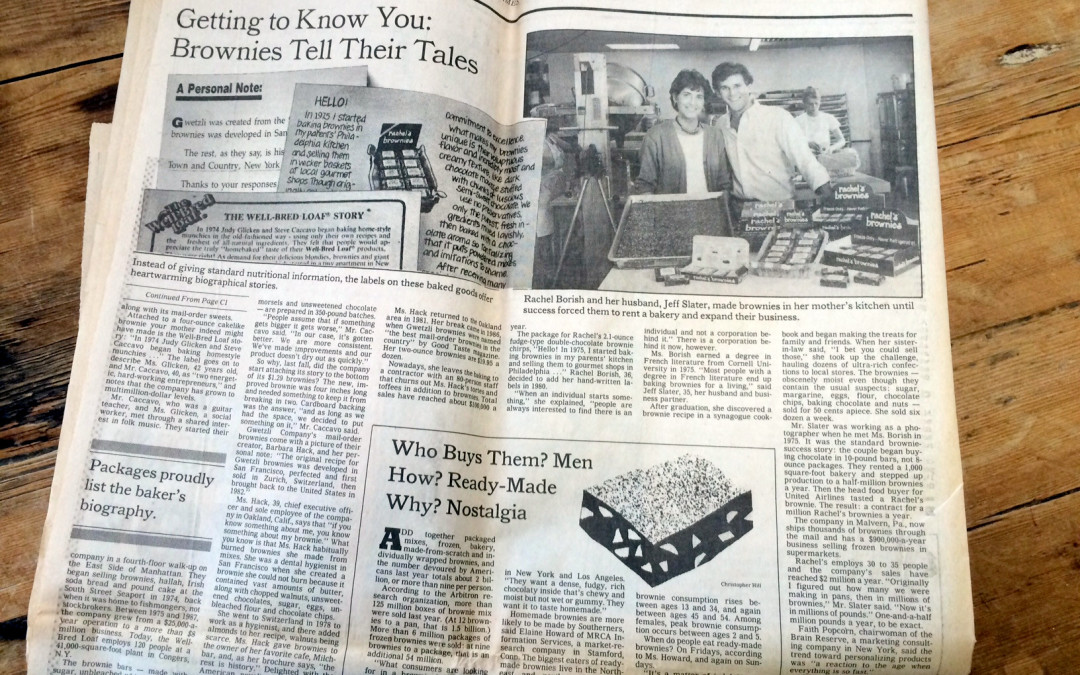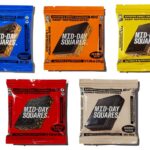I didn’t plan on becoming a foodpreneur in the 1970’s.
It wasn’t as if I leaped out of bed one morning and decided to make brownies for a living. My wife had started selling homemade brownies to the local stores in Philadelphia. I helped her out while focusing on building a commercial photography business. But as her success exploded in Philadelphia, suddenly, we were in the specialty food business. Today we would be called foodpreneurs, entrepreneurs who start a food business.
Over those fourteen years running Rachel’s Brownies, I learned many lessons about managing a food business, how to treat employees, how to market with distinction and the mechanics of running a bakery. But five lessons stand out since they helped guide my career as I transitioned from an entrepreneur into working for a large food company with bigger staff, budgets and sales goals. I think these lessons are still ripe and worth digesting today.
Five Lessons from a Foodpreneur
Foodpreneurs Must Keep Their Brand Focused. When you try and sell a new customer, they only have a little room to hear your message and to understand what is special about your product. It can’t be broad and wide – it must be narrow and deep. If it is successful, it will because you can own some piece of a consumer’s mind. The world’s best lemon bars. The world’s first plant-based pasta. The first frozen all natural preserve. The only cupcake that is both gluten-free and made with almond milk. Focus on one unique segment and be an expert. Get to be the only, the first or the best!
Foodpreneurs Must Understand the Points of Resistance at the Front Line. I always advice upcoming foodpreneurs to focus on selling the product themselves in the first year. Understand the issues at the store level like merchandising. Watch and observe how customers pick up and read your package Are you jumping off the shelf or blending into the category? Observe the push back from a buyer or local manager and hear what they say from their experience. You need to have just ten stores successfully selling the product to keep you motivated because you can find ten more stores. But knowing first-hand why they are pushing back is key. It really doesn’t matter what you make if you can’t sell it through your channel. Spend time in the channel so you can learn through firsthand observation.
If your sales are online, you need as much direct opportunity with customers to learn why they picked your products, how they found you and to understand the role your product could play in their lives. By doing every job in your business from sales, merchandising and distribution, before you hire someone to do it for you, will help you understand the challenges ahead.
Foodpreneurs Need To Resist Growing too Fast. Rapid growth shouldn’t be the goal. Growing successfully is the real objective. With Rachel’s Brownies, we had an opportunity to go from selling 50 stores to 500 stores overnight. A big chain of convenience stores called Wawa wanted the product in every store. But we told the buyer, we needed to take it slow and grow with the opportunity. He appreciated our honesty and we worked out a plan to tackle fifty stores in three months and then to revisit our progress. It was a key to our success because we had to learn so many new things double our business that rapidly. Some businesses allow you to scale faster, but in our case, slow and steady did win the race.
Foodpreneurs Must Maintain Quality, at all cost. I remember making a big mistake when I forgot to add the baking soda to our recipe one fateful day. We had at least $1,000 of ingredients and $500 of labor all tied up in an imperfect batch that we couldn’t fix. I knew the right thing to do, but it was my wife, whose name was on the brownie who said,
“I refuse to compromise even if it costs us money.”
We dumped hundreds of pounds of defective double chocolate brownie batter. I remember calling our employees together to emphasize our message of quality through our action. As we dumped the batter, I told everyone that there aren’t shortcuts to maintaining high standards. The mistake helped us create a double check system that prevented us from making this error ever again. But it also helped build a culture so that employees always knew the right thing to do based on our example.
REpurupose Your Publicity. Our story attracted a lot of attention from the media. We found that we could repurpose the stories through newsletters and other mailings to customers, distributors and brokers. In that pre-Internet world, we did what we could to keep a story alive and retell it through third-party authorities like Charlie Rose, The New York Times, Phil Donahue, USA Today and on and on. We would reprint articles and pack them into boxes shipped to stores. We created in-store signs to help share the news that the media was talking about us. We found that earned media didn’t have to go stale, like day old bread. We kept working it to help tell our story.
The food business is tough like any start up. But unlike other industries, everyone is willing to taste something new and delicious. It takes a special blend of ingredients to make a foodpreneur.
________________________________
Need help or coaching starting a food business? Do you have an idea brewing? Let’s talk.
Photograph of The New York Times from February 15, 1989




